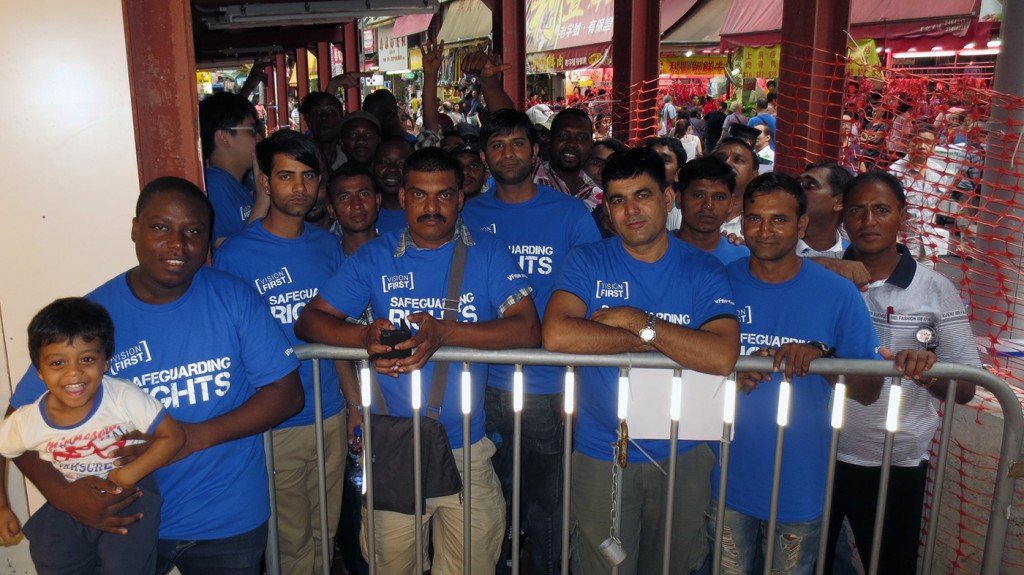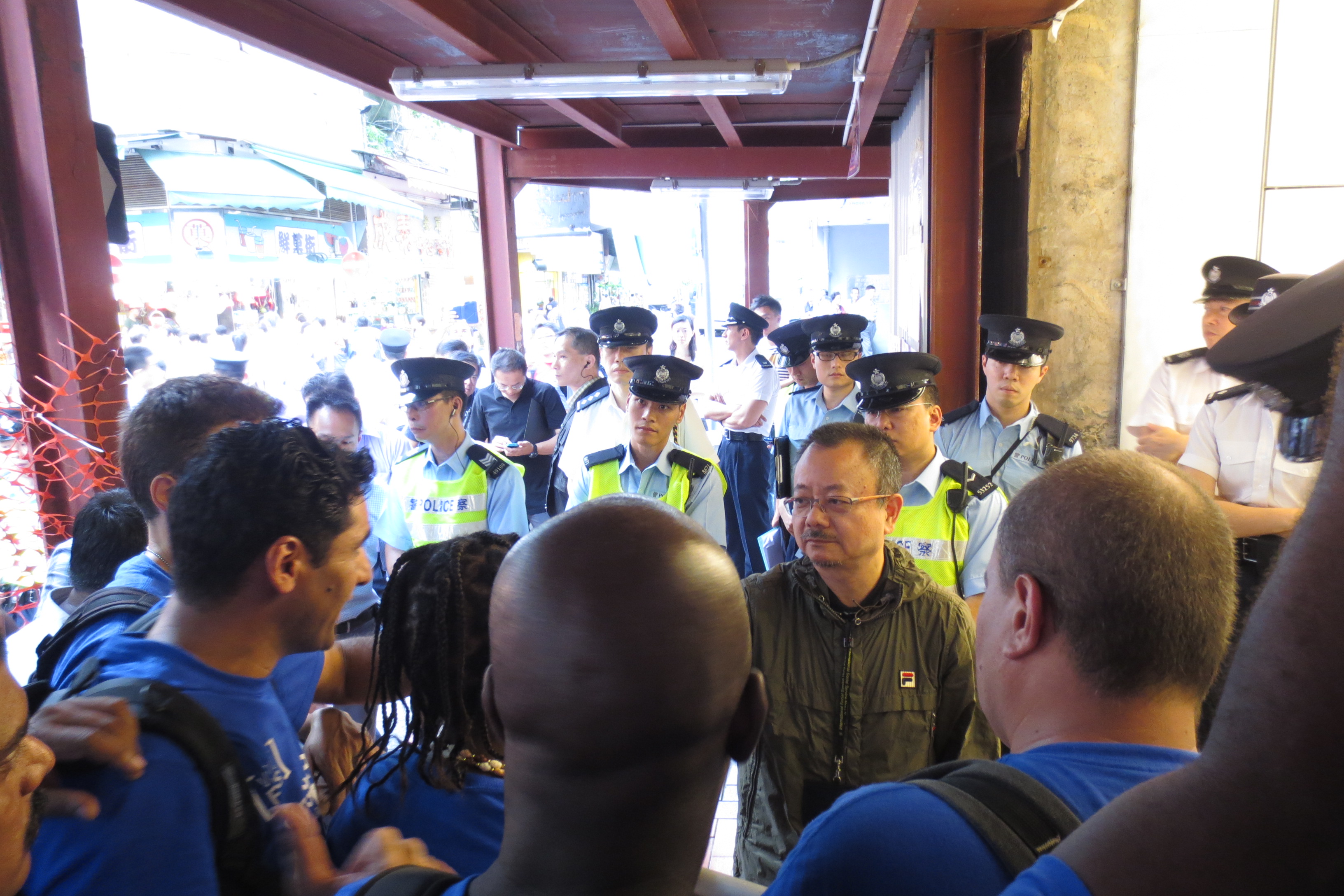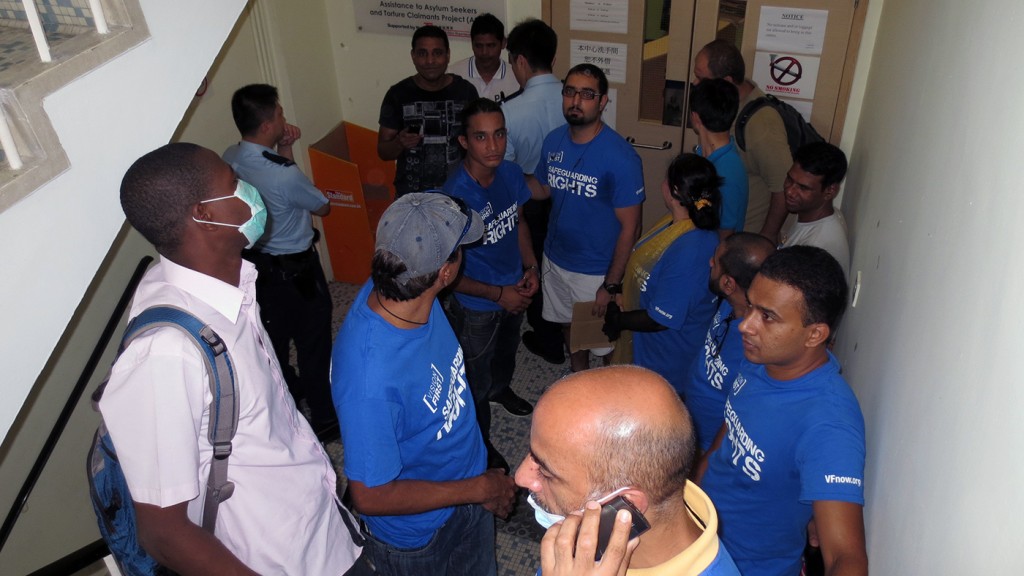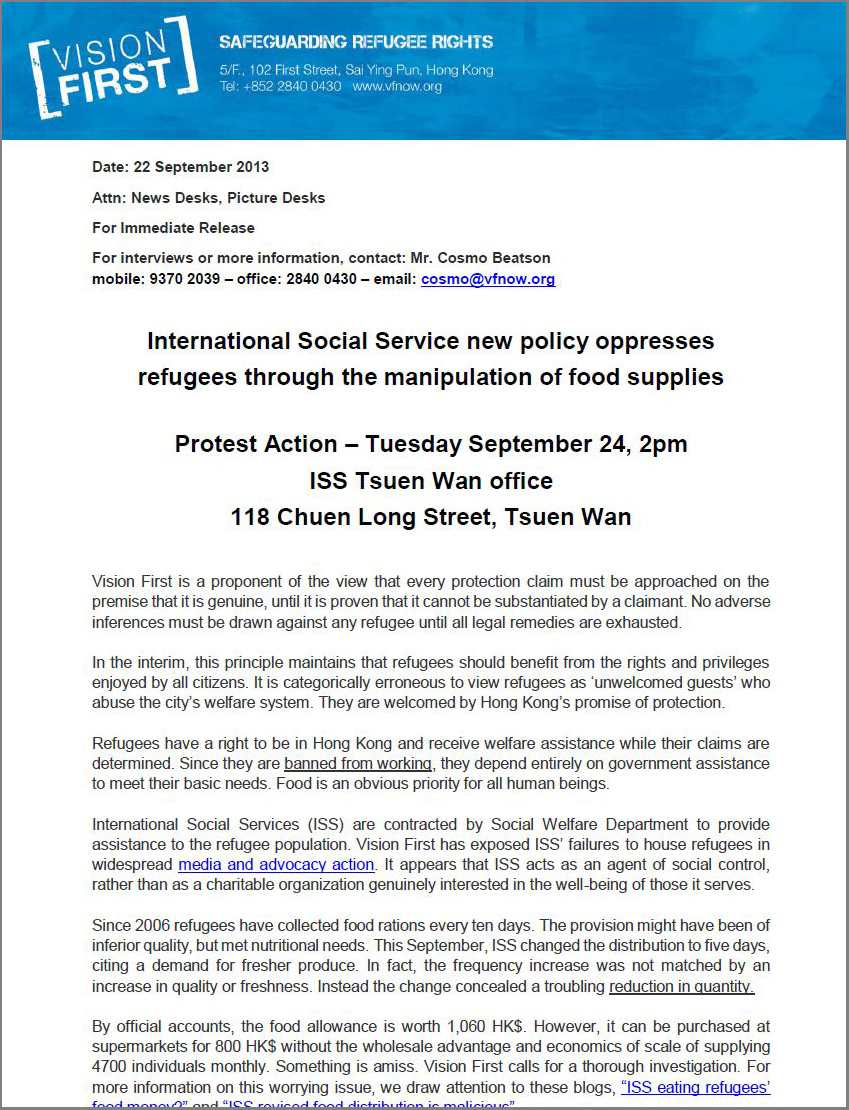Archive
Refugees protest food abuse at ISS-HK Tsuen Wan
Sep 25th, 2013 | Advocacy | Comment
On 15 July refugees protested at ISS Mongkok against being made homeless with disregard of women and children. On 2 August refugees took their action to ISS Prince Edward to oppose slum housing that condemns hundreds to dangerous living conditions. On 24 September, Vision First assisted refugees to apply for a police notice to protest outside the ISS Tsuen Wan office.
Changes to food distribution were the trigger point, though widespread dissatisfaction with welfare assistance has mobilized the community over the summer. Demonstrations appear to be building up towards a meeting with the Legislative Council Complaint Section on 15 October and the second session with the Legislative Council Panel on Welfare. Refugees are keeping up the pressure.
Public meetings attended by more than 50 persons require a police notification. This removes the element of surprise and much spontaneity from any manifestation. There was also the certainty that nobody would be allowed into the building, let alone the ISS office, a disappointing though inevitable drawback. Refugees were frustrated, but abided the law.
On the street, 80 protesters were matched one-for-one by the police, including a dozen CID officers who paced nervously, keeping refugees under vigilant watch. The authorities designated an acceptable protest zone by the building entrance. Most demonstrators obliged, though many roamed the streets displeased with the overwhelming police presence. And backup vans were around the corner.
Several refugees had made appointment with caseworkers before the protest was announced. Those appointments were duly cancelled. Others phoned in to visit and were told staff was away. ISS was determined to neither negotiate, nor acknowledge any complaints. That was final! Previous experiences made ISS intransigence clear. The demonstrators had no illusions today would be different.
With police mediation, attempts were made to set up a meeting with ISS bunkered down in state of fear. Assurances were made that refugees came in peace. Besides, it seemed that all the Tsuen Wan police revolvers were on Chuen Long Street! At 4pm a delegation of a Pakistani, Bangladeshi, Srilankan and two Africans ventured upstairs with a police escort. The aim was to express these points:
- Refugees are not allowed to work
- Refugees depend entirely on ISS assistance to survive
- Refugees receive insufficient rations of poor quality food
- Refugees oppose the change from 3x to 6x a month food collection
Not a big deal by any account. The delegation was not impressed by the door ISS bolted before them. It was a repeat of the Prince Edward stonewalling treatment. Such tactics were disappointing to everyone and infuriating to some. The obstruction to talks was absolute. ISS staff were instructed to bunker down. Alas, an opportunity to sit down and talk was missed. ISS, the agent of social oppression, stood proud!
To avoid escalation, refugees informed the police the stalemate had to be broken. It was suggested that ISS send down ONE delegate – somebody to hide behind police shields, if need by – to listen to the pleas of those they serve. That was the absolute minimum the demonstrators would accept to call it a day and keep frayed emotions from swelling.
The ISS leadership relented realized it was a reasonable demand. Mr. Ben Hon, Security Manager, was delegated to descend to the street and hear it straight from the crowd. The protesters were seriously disappointed at his sight and asked for the manager or a case worker instead. Regrettably, for reasons other than diplomacy nobody else would give respect to highly vulnerable refugees. Another sad day for ISS.
Caught between a rock (no work permits) and a hard place (insufficient food), refugees are degraded and forced to beg. The Culture of Rejection is strong. Immigration has rejected 3,644 torture claimants since December. The 1200$ rent assistance hardly secures a hut in the slums. The food supplied is insufficient and often spoiled. The cost of schooling and medical care are not fully covered. There are no provisions for clothes, shoes and other daily necessities.
However, 15-22 month incarceration are guaranteed for those who risking part-time work. Does any resident wish to experience this struggle just for one month? It is apparent that only a HUNGER STRIKE will draw adequate attention to the hardship that is exasperating refugees by intent and by design.

Demand letters to Eastweek and HK Standard
Sep 25th, 2013 | Advocacy, Media | Comment
click to read demand letter

click to read demand letter
Refugees protest against food shortages at ISS office
Sep 25th, 2013 | Food | Comment
Vision First assisted refugees to apply for a police notice to protest outside the ISS Tsuen Wan office on 24 September 2013.
Changes to food distribution were the trigger point, though widespread dissatisfaction with welfare assistance has mobilized the community over the summer. Demonstrations appear to be building up towards a meeting with the Legislative Council Complaint Section on 15 October and the second session with the Legislative Council Panel on Welfare. Refugees are keeping up the pressure.
Public meetings attended by more than 50 persons require a police notification. This removes the element of surprise and much spontaneity from any manifestation. There was also the certainty that nobody would be allowed into the building, let alone the ISS office, a disappointing though inevitable drawback. Refugees were frustrated, but abided the law.
On the street, 80 protesters were matched one-for-one by the police, including a dozen CID officers who paced nervously, keeping refugees under vigilant watch. The authorities designated an acceptable protest zone by the building entrance. Most demonstrators obliged, though many roamed the streets displeased with the overwhelming police presence. And backup vans were around the corner.
Several refugees had made appointment with caseworkers before the protest was announced. Those appointments were duly cancelled. Others phoned in to visit and were told staff was away. ISS was determined to neither negotiate, nor acknowledge any complaints. That was final! Previous experiences made ISS intransigence clear. The demonstrators had no illusions today would be different.
With police mediation, attempts were made to set up a meeting with ISS bunkered down in state of fear. Assurances were made that refugees came in peace. Besides, it seemed that all the Tsuen Wan police revolvers were on Chuen Long Street! At 4pm a delegation of a Pakistani, Bangladeshi, Srilankan and two Africans ventured upstairs with a police escort. The aim was to express these points:
– Refugees are not allowed to work
– They depend entirely on ISS assistance to survive
– The receive insufficient rations of poor quality food
– They oppose the change from 3x to 6x a month food collection
Not a big deal by any account. The delegation was not impressed by the door ISS bolted before them. It was a repeat of the Prince Edward stonewalling treatment. Such tactics were disappointing to everyone and infuriating to some. The obstruction to talks was absolute. ISS staff were instructed to bunker down. Alas, an opportunity to sit down and talk was missed. ISS, the agent of social oppression, stood proud!
To avoid escalation, refugees informed the police the stalemate had to be broken. It was suggested that ISS send down ONE delegate – somebody to hide behind police shields, if need by – to listen to the pleas of those they serve. That was the absolute minimum the demonstrators would accept to call it a day and keep frayed emotions from swelling.
Thankfully ISS leadership realized it was a reasonable demand and Mr. Ben Hon, Security Manager, was delegated to descend to the street and hear it straight from the crowd. The protesters were seriously disappointed at his sight and asked for the manager or a case worker instead. Regrettably, for reasons other than diplomacy nobody else would give respect to highly vulnerable refugees. Another sad day for ISS.
Caught between a rock (no work permits) and a hard place (insufficient food), refugees are degraded and forced to beg. The Culture of Rejection is strong. Immigration has rejected 3,644 torture claimants since December. The 1200$ rent assistance hardly secures a hut in the slums. The food supplied is insufficient and often spoiled. The cost of schooling and medical care are not fully covered. There are no provisions for clothes, shoes and other daily necessities.
However, 15-22 month incarceration are guaranteed for those who risking part-time work. Does any resident wish to experience this struggle just for one month? It is apparent that only a HUNGER STRIKE will draw adequate attention to the hardship that is exasperating refugees by intent and by design.

Government admits putting asylum seekers in homes not fit to live in
Sep 24th, 2013 | Advocacy, Media | Comment
Danny Lee writes for South China Morning Post on 23 September 2013
Welfare department says asylum seekers are housed in non-residential accommodation. But police drop investigation into slum scandal
The Social Welfare Department has admitted its contractor in charge of asylum seekers’ welfare is housing clients in homes not fit to live in. However, police have dropped their investigation into how some asylum seekers came to be living in squalor due to a lack of evidence. A spokeswoman for the department said the contractor, the International Social Service Hong Kong Branch (ISS-HK), had asked more than 110 asylum seekers to move out of accommodation not fit for residential use. The result is a stand-off as clients are refusing to move.
“The ISS-HK has contacted more than 110 asylum seekers and refugees who are living in areas not meant for residential purposes and has been discussing alternative accommodation with them,” the spokeswoman said. “But they all prefer to stay in their current abodes, which they secured themselves. ISS-HK will continue to encourage them to move out and will mobilise the necessary resources to help them.”
It is believed the asylum seekers are reluctant to move because their homes – which would have been subject to ISS-HK approval – are relatively cheap. Even so, they often cost more than the ISS-HK housing allowance, and many of the asylum seekers have found jobs locally, albeit illegally, to help pay the extra cost.
News that police were dropping the investigation into asylum seekers’ living conditions delivered a blow to human rights advocates seeking to overhaul the city’s welfare system for these people. The degrading conditions in which some are living came to light when a man was rushed to hospital after drinking contaminated water. His home was then found to be a stinking old pigeon shed with no drinking water.
A police spokesman said: “The evidence obtained during the investigation has been seriously considered. As there is insufficient evidence to support the commission of any offence by any person, there will be no further investigation at this stage.” Adrielle Panares, ISS-HK’s migrants programme director, insisted no asylum seeker was living in inappropriate housing. “We are continuously monitoring the conditions of the clients, as per our practice. This means that we review each service user’s assistance every month, conduct home visits, and, with the service users, look into addressing their concerns and needs,” she said.
Robert Tibbo, a barrister specialising in human rights cases and a non-executive director of rights group Vision First, said ISS-HK was not taking responsibility. “This effort to move the asylum seekers out of a few identified slums was apparently an ad hoc attempt to make the issue of slums disappear,” he said. “Over many years, ISS has systematically placed asylum seekers into many slums located across Hong Kong.”
The welfare department declined to say how long the practice of accommodating asylum seekers in the makeshift rooms had been going on. A previous investigation by the South China Morning Post found hundreds of asylum seekers living in squalor in outlying areas of the New Territories. Rooms had no toilets or fresh drinking water but were paid for and approved by the ISS-HK.
The ISS-HK receives HK$203 million from the government to pay for asylum seekers’ welfare. The money, which is not given to them directly, covers rent, a pack of groceries every five days and other basic necessities. The budget increased more than 30 per cent this year because of the number of new ISS-HK clients requiring assistance.
![SCMP 23Sep13]](http://visionfirstnow.org/uploads/SCMP-23Sep13-600x481.jpg)
Indian asylum seeker Gupta Raja’s makeshift home at a slum at Nai Wai, Tuen Mun. Photo: Sam Tsang
Testing rotten eggs supplied by ISS
Sep 24th, 2013 | Advocacy | Comment
Eggs distributed to refugees are either rotten or unpleasantly ‘liquid’
Verdict: not fit for consumption!
ISS new policy oppresses refugees through the manipulation of food supplies
Sep 22nd, 2013 | Advocacy, Food, VF updates, programs, events, Welfare | Comment
Against ISS-HK’s malicious food distribution
Sep 15th, 2013 | Advocacy | Comment
Since April 2006 there were complaints about the quantity and mostly the quality of food, but refugees managed to eat sufficiently. Nobody was hungry and meals were balanced. Refugees visited contracted grocery shops three times monthly to collect two bags of groceries with a variety of food groups. There were carbohydrates to eat with proteins and vegetables to cook with other ingredients. Poor quality maybe, but a good mix.
Last night a desperate mother emailed, “It’s more than worse than before with the food provided to me. How can i feed three kids on ten rotten eggs given to me on the first time? And they say the food is fresh. (We collected) 1 liter of milk, 6 packs of juice, 6 pieces of meat and 1 chicken piece”. Another mother called in tears. She complained she had no rice, pasta or bread to feed her hungry children. She said the shop gave her a fish head.
Something is amiss. ISS’ decision to enforce a six-times-a-month food distribution is hard to comprehend. ISS claims refugees requested more frequent collections, namely every 5 vs. 10 days. This however cannot be generally true, given long travelling distances and longer arguments over bus fares. ISS claims this ensures fresher produce, but small heads of lettuce and wilted broccoli fail to justify the aggravation. At best, ISS solved one problem by creating a bigger one!
We were informed by a reliable government source that, “the revised arrangement was proposed in response to previous requests by torture claimants / asylum seekers.” However, one ISS senior manager stated to a refugee that, “we don’t really have any choice and we have to do it six times … I can’t change the government’s policy, right?”
Among conflicting statements, the reality angers refugees and even shop owners. While a refugee collected 10Kg of rice, 500gr of flour and 1 tin of ghee with nothing else, another collects 1 chicken, detergent, coffee, sugar and fruit juice with no staple foods. And yet both had to ration their welfare assistance for five days. Children are worse off with powder milk and cornflakes for breakfast, lunch and dinner for the period. Finally, we are sorry for the mother who collected a dozen rotten eggs!
The facts are astounding. Mothers are crying at collection points, while children cling on in tears. Men shout angrily and refuse to take home what amounts to an insult. One said, “What will I say to my wife?” Meetings are called. Gatherings are forming. Anger is building up to a dangerous point. We measure our words carefully saying that refugees haven’t been pushed so hard against the wall. The reaction is one ISS must take full responsibility for.
This organization (under police investigation) is doing nothing to mitigate a critical situation and reach out to those it should actually enjoy serving. International Social Service has seemingly confused the concept of ‘social service’ with that of ‘social control’. ISS appears to relish inflicting hardship at every opportunity. In fact, it appears this NGO cares nothing about those it serves and persistently disregards the good of its clients by deploying harmful services. ISS doesn’t seem to get anything right lately. Perhaps they never did.







